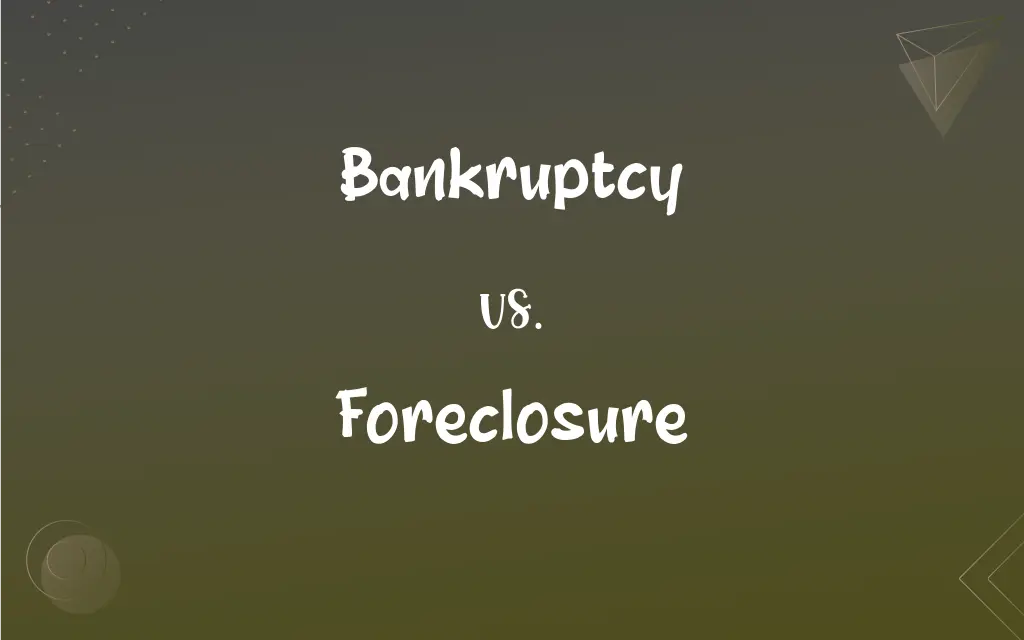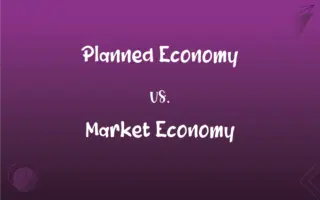Bankruptcy vs. Foreclosure: What's the Difference?
Edited by Harlon Moss || By Janet White || Published on January 29, 2024
Bankruptcy is a legal process for individuals or entities who cannot repay debts, while foreclosure is a legal process where a lender takes possession of a property due to unpaid mortgage.

Key Differences
Bankruptcy is a legal procedure where individuals or businesses seek relief from debts they are unable to repay. Foreclosure, conversely, is a specific legal process initiated by lenders to recover the balance of a loan from a borrower who has stopped making payments, typically involving the seizure and sale of the borrower's property.
In bankruptcy, a court examines the debtor's assets and liabilities and may discharge some or all debt. In foreclosure, the focus is solely on the property used as collateral for a loan, and the process results in the lender taking ownership of this property to offset the unpaid loan.
Bankruptcy can offer various solutions, like restructuring debts or liquidating assets, depending on the type of bankruptcy filed (e.g., Chapter 7 or Chapter 13 in the U.S.). Foreclosure, however, leads to the loss of a home or property, as it is specifically related to mortgage or loan defaults.
The impact of bankruptcy can be broad, affecting various aspects of the debtor’s financial life and credit rating. Foreclosure impacts are more focused, primarily relating to the loss of a home and the associated credit implications.
Bankruptcy proceedings are typically initiated by the debtor, though creditors can also file a bankruptcy petition against a debtor. Foreclosure is always initiated by the lender or financial institution when a borrower fails to make payments according to their mortgage agreement.
ADVERTISEMENT
Comparison Chart
Definition
Legal process for debt relief
Legal process to seize property for loan repayment
Initiated by
Debtor or creditors
Lender
Scope
Broad (all debts and assets)
Specific (property used as loan collateral)
Outcome
Possible debt discharge or restructuring
Loss of property
Credit Impact
Generally negative impact on credit for several years
Negative impact on credit, particularly regarding homeownership
ADVERTISEMENT
Bankruptcy and Foreclosure Definitions
Bankruptcy
Bankruptcy proceedings assess a debtor's assets and liabilities.
During the bankruptcy process, his assets were evaluated to repay creditors.
Foreclosure
Foreclosure results in the lender selling the property to recover the loan amount.
The foreclosure sale was held to recoup the unpaid mortgage balance.
Bankruptcy
Bankruptcy involves the legal process of debt elimination or reorganization.
He considered bankruptcy to manage his overwhelming credit card debts.
Foreclosure
Foreclosure occurs when a borrower defaults on their mortgage payments.
Foreclosure proceedings began when they could no longer afford their home loan.
Bankruptcy
Bankruptcy provides a way for debtors to get relief from debt burden.
Bankruptcy allowed her to start afresh financially.
Foreclosure
Foreclosure typically follows a default on a secured loan like a mortgage.
The foreclosure notice was a consequence of consecutive loan defaults.
Bankruptcy
Bankruptcy can result in either liquidation or a repayment plan.
They chose Chapter 13 bankruptcy for a structured debt repayment plan.
Foreclosure
Foreclosure is a legal process where a lender takes control of a property due to unpaid mortgage.
The bank initiated foreclosure after several missed mortgage payments.
Bankruptcy
The state of being bankrupt.
Foreclosure
Foreclosure can be judicial or non-judicial, depending on state laws.
They faced a judicial foreclosure, requiring court proceedings.
Bankruptcy
A legal proceeding that allows for a person or entity to be declared bankrupt.
Foreclosure
The act of foreclosing, especially a legal proceeding by which a mortgage is foreclosed.
Bankruptcy
The system of adjudication that declares instances of bankruptcy
Went into bankruptcy.
Foreclosure
A property that has undergone foreclosure
Decided to purchase a foreclosure.
Bankruptcy
A legally declared or recognized condition of insolvency of a person or organization.
Foreclosure
(legal) the proceeding, by a creditor, to regain property or other collateral following a default on mortgage payments
Bankruptcy
The state of being actually or legally bankrupt.
Foreclosure
(psychoanalysis) The absence of a symbolic father for a fatherless child, as a cause for psychosis.
Bankruptcy
The act or process of becoming a bankrupt.
Foreclosure
The act or process of foreclosing; a proceeding which bars or extinguishes a mortgager's right of redeeming a mortgaged estate.
Bankruptcy
Complete loss; - followed by of.
Foreclosure
The legal proceedings initiated by a creditor to repossess the collateral for loan that is in default
Bankruptcy
A state of complete lack of some abstract property;
Spiritual bankruptcy
Moral bankruptcy
Intellectual bankruptcy
Bankruptcy
Inability to discharge all your debts as they come due;
The company had to declare bankruptcy
Fraudulent loans led to the failure of many banks
Bankruptcy
A legal process intended to insure equality among the creditors of a corporation declared in bankruptcy
Bankruptcy
Bankruptcy is a legal status for individuals or entities unable to repay their debts.
The company filed for bankruptcy after failing to recover from its financial losses.
FAQs
How does foreclosure affect credit?
Foreclosure significantly negatively impacts credit, especially in homeownership contexts.
What is foreclosure?
Foreclosure is the legal process where a lender takes possession of a property for unpaid mortgages.
What are the types of bankruptcy?
Common types include Chapter 7 (liquidation) and Chapter 13 (reorganization) bankruptcy.
Can bankruptcy stop foreclosure?
Yes, filing for bankruptcy can temporarily halt foreclosure proceedings.
What debts are discharged in bankruptcy?
Most unsecured debts, like credit card debts, can be discharged in bankruptcy.
Is foreclosure a public record?
Yes, foreclosure proceedings are typically a matter of public record.
Can you buy a house after foreclosure?
Yes, but it typically requires a waiting period and rebuilding credit.
Can you recover from bankruptcy?
Yes, many people rebuild their credit and financial stability after bankruptcy.
How long does bankruptcy stay on credit reports?
Bankruptcy can stay on credit reports for 7 to 10 years.
Does foreclosure always lead to eviction?
Yes, foreclosure usually results in the borrower having to vacate the property.
What is bankruptcy?
Bankruptcy is a legal process for those who cannot repay their debts.
How quickly can foreclosure occur?
The timeline for foreclosure varies but usually takes several months after the first missed payment.
What happens to mortgage debt in foreclosure?
The mortgage debt is typically settled from the proceeds of the foreclosure sale.
What leads to foreclosure?
Foreclosure typically results from defaulting on mortgage payments.
Can all types of debts be resolved through bankruptcy?
Not all debts, such as certain taxes and student loans, can be resolved through bankruptcy.
Is filing for bankruptcy a public act?
Yes, bankruptcy filings are public records.
Can you negotiate with lenders in both processes?
Yes, negotiation is possible in both bankruptcy and foreclosure situations.
What is the difference between foreclosure and selling a home?
Foreclosure is involuntary and initiated by the lender, whereas selling a home is a voluntary act by the homeowner.
What assets can be protected in bankruptcy?
Certain assets, like primary residences and retirement accounts, may be protected in bankruptcy.
Can foreclosure be reversed?
It's challenging but possible through options like loan reinstatement or modifications.
About Author
Written by
Janet WhiteJanet White has been an esteemed writer and blogger for Difference Wiki. Holding a Master's degree in Science and Medical Journalism from the prestigious Boston University, she has consistently demonstrated her expertise and passion for her field. When she's not immersed in her work, Janet relishes her time exercising, delving into a good book, and cherishing moments with friends and family.
Edited by
Harlon MossHarlon is a seasoned quality moderator and accomplished content writer for Difference Wiki. An alumnus of the prestigious University of California, he earned his degree in Computer Science. Leveraging his academic background, Harlon brings a meticulous and informed perspective to his work, ensuring content accuracy and excellence.







































































